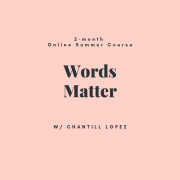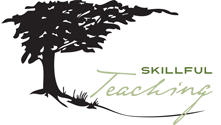Does Writing Scare You?
Do you suck at it?
Would you like to be better at it?
Less afraid?
One of the things I hear from teachers over and over again is how difficult it is to sit down and write. Either it feels too daunting or they just don’t like it or they think they’re not good at it. Sometimes they believe they have to do it (which you do if you’re in business), convince themselves that they WANT to, then NEVER do it because they actually DON’T like it and are kinda no good at it.
Whatever the case, working with the written word can be a big roadblock for a lot of people. A LOT of people. Whether you’re struggling to write copy for your website or marketing material or you feel dissatisfied with your bio (bigger question: when was the last time you even looked at your bio?) spending a little time working on getting better at writing has a huge ROI?
On a whim, I decided to put together a two-month online workshop all about words called Words Matter.
We start Monday, July 1st, and I believe this is one of the best things you could spend your summer doing — working on intentionally crafting your words both in writing and the ones that come out of your mouth.
I’m going to tell you all about it below, but for the moment I’d love to share some things you can do right away to make friends with the writing process.
Simple Tricks to Better Writing (+ Cueing)
RIGHT Now!
The Power of LESS (POL) –
In writing, speaking, and teaching the hard truth is no matter how much you have to say (and no matter how good/essential it might seem), saying less makes a bigger more lasting impact than saying everything. One way to think of it is dosing. You have to CHOOSE your words wisely, dose your students/audience appropriately. It’s not just a cliche, it’s the bottom line.
Here’s why:
The modern human has a trained short attention span. It’s not ADD, it’s modernity, this day and age…for real. With all the instant access, flashing lights, pop-ups, and the ability to switch from app to app or screen to screen we don’t know how to sit still long enough to read something.
TIP #1
A very good writing practice is to cut AT LEAST 30% of your rough draft. Always. Even good writers say too much on the first pass.
When in doubt CUT, slash, reduce, redact, take out all the unnecessary words! Notice when you use two words that mean the same thing but don’t add value to a sentence.
For instance, the word chain above “cut, slash, reduce, redact…etc.” has the real potential for being edited down to just the word “cut”.
I chose to use four words and a phrase that all mean the same thing to express emphasis and to be dramatic AND to be a little cheeky which is part of my writing voice. These are choices.
The problem is when you do it on accident.
TIP #2
I have to credit one of my favorite authors, Stephen King, for this one. Eliminate adverbs.
Always.
Adverbs weigh down your writing without adding quality or value. They muck up a sentence and make it seem like it (you) is trying too hard. Especially in educational writing or marketing — so anything on your website — adverbs are fluff better found in fiction (but not even then).
On Talking Too Much
Also, your brain has limited capacity for taking in new information. Research shows that after roughly 20 minutes (varies depending on age) of listening your brain begins to have a hard time actually hearing what’s being said.
For most of us, that’s two-thirds of a session or class that our students are essentially tuning out.
TIP #3
In writing and cueing a healthy exercise is to try to say what you want to say in three words or less.
Try three word cues for most of your directing needs. Push out slow. Inhale, pull down. Reach out long. Exhale completely.
Cueing like this leaves plenty of space for contemplation and integration and more time for you to actually seeing what’s going on and cue to the needs of your student…as opposed to the rote dictatorial cueing we get stuck in.
The three-words or less exercise is one that we’ll be diving into in our Words Matter course. It’s a powerful tool to return to now and again no matter how experienced you are.
POL HACK
Leave lots of white space in your writing, on your website and in your marketing material including blogs and newsletters.
It’s much easier to digest and will help elicit a “YES” from the reader when they’re deciding if they have time to read what you wrote.
If you write everything in one block and words fill the entire page, immediately it’s a “No. This is interesting, but I just don’t have the time.”
Leave lots of empty space in your cueing. This is nearly impossible for many of us because we believe that to give value we need to give our students lots of support. Keeping instructing, guiding, informing, insighting to add value to their experience.
Truth: It’s too much.
And. It leaves zero room for the student to think for themselves or consider the five things you just said about footwork.
Words Matter Online Summer Course
July 1 – September 1
Give your brain a rest from technique and repertoire this summer and focus on one of the other most critical skills required of you as a teacher and business person. Words.
In this 2-month online — casual and yet powerful course — (that you’ll have access to forever), learn how to improve your sense of words, how to choose more meaningful words, and how to use them in written and spoken form more readily and with more skill.
- Enhance your ability to write succinctly and passionately about what you do
- Improve your verbal cueing to promote better understanding, more curiosity, and longer lasting results
- Engage in practices and tools that you can apply to your business and teaching right now!
Includes: 4 Online Workshops Modules
- July 1 – July 13 (2 wks): Words Matter – A Foundation
- Choosing your words:
- Why, how, when, what for and the science behind it all
- Creating a language library
- What is it you ACTUALLY want to say anyway?
- Choosing your words:
- Identifying challenges and roadblocks and setting goals for program
- Group calls Sundays 7/7
- July 14 – 27 (2 wks): All About You + Your Vision
- What is your vision?
- How do you tell your story
- Creating a better bio
- Creating an Authentic Invitation (the age old elevator pitch but WAY better)
- Using your language library for EVERYTHING
- Group call Sunday 7/21
- July 28 – August 17 (3 wks): The Art and Craft of Verbal Cueing
- Effective Language Tools
- Word Choice
- Useful Tips For Applying Anatomical Language
- Exercises:
- Three Words ONLY
- Audio recording and feedback
- Exercises:
- The Power of Verbs – A Brainstorming Exercise
- Group calls Sundays 8/4, 8/18
- August 18 – 31 (2 wks): Talking Your Walk + The Journey Onward
- The power of how you say what you say
- Polyvagal theory and sound science
- The dance between training and facilitating
- How to ask good questions
- Practice and feedback – case study and self-evaluation
- How to move forward to complete work started
- Group calls Sunday 9/1
Bonus Material –
- Early Release (signed copy) of Teaching (Movement) Matters
- Access to Improving Movement Through Mindfulness – 5 Techniques (audio recordings)
Investment
- $297
- $197… (use code RETURNING)
- For anyone in the mentoring program 3-years and beyond (free to years 1 + 2), or anyone who’s taken an ST workshop in the past 3 years or ever purchased an online course (including the 28 day course)
- Add-ons:
- $45/30-mins of coaching or writing/editing anytime (July 1 – September 1)
Learn more + enroll

 How are you showing up? Why are you showing up? Why do you teach? What IS teaching? Why do you care? This is Skillful Teaching: A Whole-person approach to being an expert teacher, not an expert technician. There's a difference. Want to know what it is?
How are you showing up? Why are you showing up? Why do you teach? What IS teaching? Why do you care? This is Skillful Teaching: A Whole-person approach to being an expert teacher, not an expert technician. There's a difference. Want to know what it is?